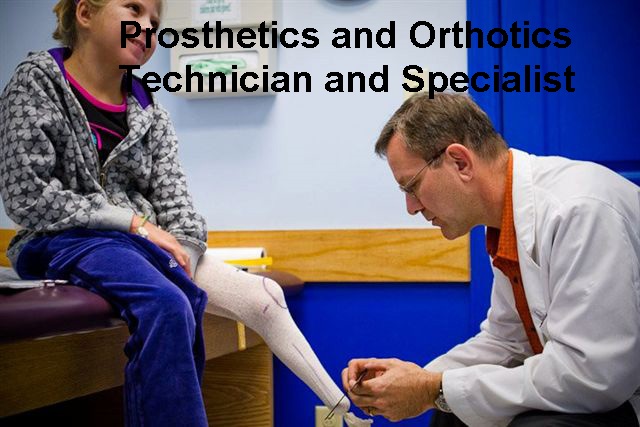Prosthetic Orthotic Technician Career Opportunities in Pakistan Scope Jobs Requirements guideline for admissions, courses, important programs, experience training scheme with income details for start career as Prosthetic Orthotic Technician. Prosthetic and Orthotic Technician. Prosthetic and orthotic technicians work with prosthetists and orthotists to produce, fabricate and repair prostheses (artificial limbs) and orthoses (braces and supports) that are used to support weakened body parts, correct body defects or replace amputated limbs.
[lwptoc]
Prosthetic Orthotic Technician Degree Study:
The first is to complete a NCOPE-accredited technician program. The second option is to obtain a high school diploma, GED, or college degree and then work for two years under the supervision of a certified practitioner or technician in orthotics, prosthetics, or both.
To get on to a degree you will usually need at least five GCSEs (A-C), including English, maths and a science-based subject, as well as three A levels, including maths and either biology, physics or chemistry. Check with course providers for exact entry details because alternative qualifications may also be accepted.
A master’s degree in orthotics and prosthetics is required to work as a prosthetist, along with a 1-year residency. During this education and training, students learn about various types of devices and get clinical experience. After completing these requirements, they can take the national certification exam.
Prosthetic Orthotic Technician Career Opportunities in Pakistan

Prosthetic Orthotic Technician Work:
A prosthetist, commonly referred to as an orthotist, is a licenced health care provider that creates and evaluates prosthetic medical devices. An artificial device known as a prosthesis is used to replace a bodily component that is missing, not functional, or has been partially or entirely destroyed.
Physical therapists are well-suited to the field of prosthetics rehabilitation. Strength training, gait training, balancing exercises, cardiovascular activity, as well as instruction in the science of pain, are often required of patients participating in prosthetics rehab.
While a medical appliance technician may only need a post-secondary certificate or associate’s degree with certification or licencing being, becoming an orthotist or prosthetist requires the completion of a master’s degree in Orthotics and Prosthetics with certification or licencing required in some states.
According to the World Health Organisation, a prosthetist and orthotist is a medical specialist who is in charge of treating patients with prosthetics and orthotics and who has the authority to direct and guide the work of other staff members.
Areas of Study in Prosthetics & Orthotics
urriculum includes:
| · Medical Science | · Musculoskeletal Anatomy |
| · Upper & Lower Extremities Prosthetics | · Spinal Orthotics |
| · Prosthetic & Orthotic Procedures including Bio-mechanics | · Research Methodology
|
| · Leadership, Management & Professional / Medical Ethics | · Material & Workshop technologies
|
| · Graphical communication. |
Career Opportunities
O&P is an allied health profession with a wide range of interesting job openings. For the purpose of designing, fabricating, and fitting patients with desperately required artificial limbs or braces, graduates in prosthetics and orthotics learn highly technical, critical thinking, problem-solving, and communication abilities. They also run enterprises, do research, give classes, consult with patients, and consult with other healthcare experts. Among potential employers are:
- Private Practice
- Rehabilitation Centers
- Specialty clinics and home health settings
- Medical Clinics
- Medical Equipment Manufacturing Companies
- Colleges and Universities
- Non-Profit Organizations and Government Agencies
Program Facts
| Available Seats | 45 seats per semester |
| Duration | 8 semesters (4 years) |
| Credit Hours | 136 |
| Eligibility Criteria | F.Sc.(pre-medical) with minimum unadjusted 50% marks from BISE Pakistan or equivalent examination recognized from IBCC |
| Admission Criteria | Academic Qualification 60%. Test & Interview 40% |
| Intake | Spring & Fall (twice a year) |
| Class Timings | 08:00 am to 02:00 pm (Mon to Fri) |
